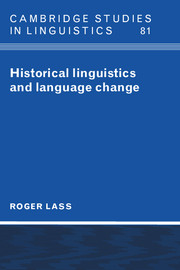Book contents
- Frontmatter
- Contents
- Preface
- Conventions, abbreviations and symbols
- General prologue: time travel and signal processing
- 1 The past, the present and the historian
- 2 Written records: evidence and argument
- 3 Relatedness, ancestry and comparison
- 4 Convergence and contact
- 5 The nature of reconstruction
- 6 Time and change: the shape(s) of history
- 7 Explanation and ontology
- References
- Index of names
- Subject index
4 - Convergence and contact
Published online by Cambridge University Press: 05 June 2012
- Frontmatter
- Contents
- Preface
- Conventions, abbreviations and symbols
- General prologue: time travel and signal processing
- 1 The past, the present and the historian
- 2 Written records: evidence and argument
- 3 Relatedness, ancestry and comparison
- 4 Convergence and contact
- 5 The nature of reconstruction
- 6 Time and change: the shape(s) of history
- 7 Explanation and ontology
- References
- Index of names
- Subject index
Summary
Zum Ergreifen der Wahrheit braucht es ein viel höheres Organ als zur Verteidigung des Irrthums.
(Goethe, Nachlass)Preliminaries
This chapter is a kind of methodological intermezzo, focussing on techniques for sorting out potentially confusable phenomena. The discussion centres on two problems that arise when trying to determine the origin of particular characters in a language: (a) distinguishing convergent developments from descent from a common original; and (b) distinguishing results of contact from either convergence or common ancestry. The two clearly have a good deal in common.
My general tone here will be somewhat negative, emphasizing either typical specimens of unconvincing argument or untenable positions. Not in a debunking spirit, but to point out some common failings, and indicate the kind of work that has to be done to make what are often good but poorly employed kinds of argument valid, or at least relatively compelling. The aim is to characterize what seems to me a specifically historical way of working that even historians, let alone non-historians making historical points, often neglect. As a kind of follow-up to the previous chapter, the emphasis will be on the comparative dimension, and its importance in providing depth for historical narrative.
- Type
- Chapter
- Information
- Historical Linguistics and Language Change , pp. 172 - 214Publisher: Cambridge University PressPrint publication year: 1997



